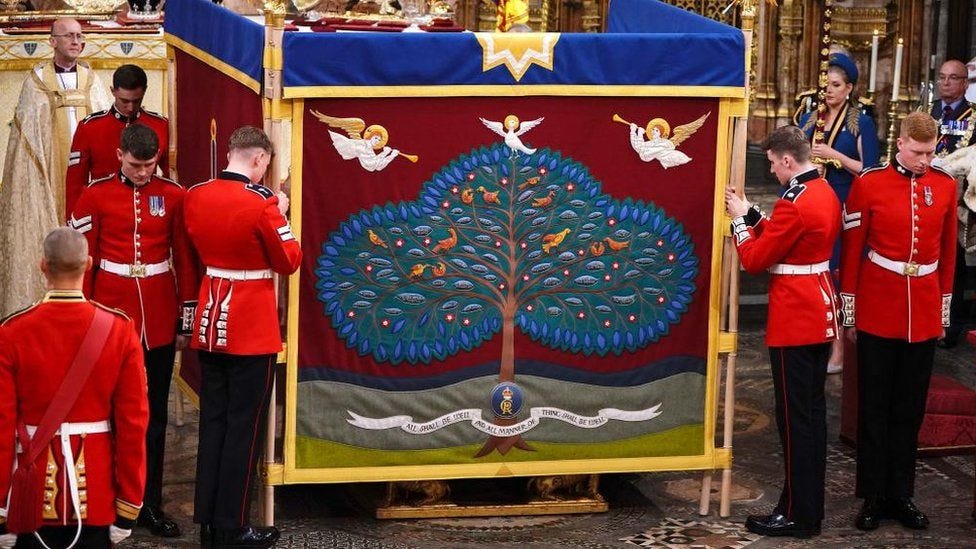Coronation: King Charles III crowned and named Defender of the Faith
King Charles and Queen Camilla Crowned in Historic Coronation Ceremony, marking a New Era for the Monarchy and Emphasizing the Importance of Service

On a historic day of pageantry, King Charles and Queen Camilla have been crowned in front of cheering crowds in front of Buckingham Palace.
Thousands of people packed the Mall, despite the rain, to catch a glimpse of the new King and Queen. The coronation service took place at Westminster Abbey, followed by a huge procession through London.
The King and Queen waved from the Palace balcony as the RAF Red Arrows painted the sky red, white, and blue. However, the BBC understands that Prince Harry was not invited to join them on the balcony.
The day began with the King's procession to Westminster Abbey in the horse-drawn Diamond Jubilee State Coach, past cheering crowds and an honour guard of 1,000 members of the armed forces. Faith leaders and commonwealth leaders began the processions, with the King and Queen following behind.
Invitees from around the world join to see the coronation
The two-hour ceremony, which was watched on TV around the world, was the first to crown a monarch in 70 years. Some 2,300 people were inside the abbey, including celebrity guests such as actress Emma Thompson and US singer Katy Perry.
US First Lady Jill Biden and her granddaughter Finnegan arrived in a three-car motorcade, although President Biden did not travel to the UK.
French President Emmanuel Macron and First Lady of Ukraine Olena Zelenska were also in the abbey, as were Prime Minister Rishi Sunak and leaders of the Commonwealth countries. In all, 90 heads of state attended, according to the Foreign Office.
The coronation's main theme was the importance of service. "I come not to be served, but to serve," the King said in his first prayer after reaching the abbey. Charles was proclaimed as the "undoubted King" in the first stage of the ceremony. The congregation was then asked to show their homage and service, shouting "God Save the King".
Without Controversy
Despite the significance of the event, the day was not without controversy. The Duke of Sussex, Prince Harry, was reportedly not invited to join the new King and Queen on the Palace balcony.
Harry had been at the ceremony in the abbey earlier, sitting two rows back from his brother Prince William – the first time they had been seen together since Harry's sensational memoir, Spare, was released. He left for the US straight afterwards.
In all, the day was a celebration of tradition and continuity, as well as the importance of service to the nation. While the new King and Queen will face significant challenges and opportunities in the years ahead, their coronation was a moment to pause and reflect on the enduring role of the monarchy in British life. As the new King himself said, "I come not to be served, but to serve".
The Sovereign and God
The coronation ceremony of King Charles and Queen Camilla was marked by traditional customs that are rarely seen in modern times. The event included the use of the orb and sceptre and the carrying of the gilded Sword of State.
During the anointing ceremony, which is considered the most sacred part of the proceedings, the King was screened from the public as he was anointed with holy oils by the Archbishop of Canterbury. This need for privacy was because it is historically regarded as a moment between the Sovereign and God.
Handel's Zadok the Priest was sung by choristers during the wait for the anointed King to reappear. Prince William also made a pledge of loyalty to King Charles and kissed him on the cheek, followed by members of the congregation offering their own support.
The newly crowned King and Queen travelled up The Mall in the Gold State Coach, flanked by thousands of servicemen and women, in a spectacle of pomp and pageantry.

Absence of Harry
The absence of Prince Harry from the balcony of Buckingham Palace was noted by many, fueling speculation about the ongoing rift between him and the rest of the royal family.
However, the ceremony itself was a testament to the enduring power and relevance of the monarchy in modern times. The procession through London, with the King and Queen riding in the Diamond Jubilee State Coach, was a reminder of the long history and tradition that underpins the British monarchy.
The ceremony inside Westminster Abbey was equally impressive, with faith leaders and commonwealth leaders leading the procession. Charles's proclamation as the "undoubted King" was met with cheers and applause from the congregation, and the singing of "God Save the King" was a powerful reminder of the role that the monarchy plays in British society.
Not to be served, but to serve
The emphasis on service throughout the ceremony was particularly noteworthy, with Charles himself acknowledging the importance of serving others in his first prayer as King. This commitment to service will undoubtedly be a hallmark of his reign and will be an important part of his legacy as a leader.
In addition to the members of the royal family, the ceremony was attended by a host of dignitaries and celebrities from around the world. Jill Biden, the First Lady of the United States, was in attendance, as were French President Emmanuel Macron and leaders from Commonwealth countries.
Overall, the coronation of King Charles and Queen Camilla was a historic moment for the British monarchy and one that will be remembered for years to come. As they begin their reign, they will no doubt face many challenges and obstacles, but their commitment to service and tradition will serve them well as they lead the country into the future.



